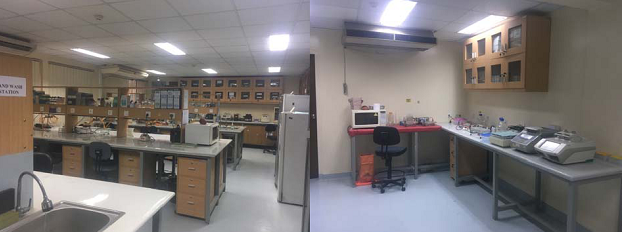Laboratory of Food Safety and One Health

Facility Head: Dr. Sirajul Islam, PhD
Dr Md Sirajul Islam, is an Emeritus Scientist and Head, the Laboratory of Food Safety and One Health at icddr,b. He obtained an MSc from University of Dhaka with First Class and PhD from the London School of Hygiene and Tropical Medicine, UK on Environmental Disease Transmission. He has been working in icddr,b for the last 40 years.
Dr Islam discovered the inter-epidemic reservoir of cholera, after which he concentrated his research on finding the ways by which the reservoirs can be destroyed to eradicate or control cholera and other water-borne diarrhoeal diseases. He worked on purification of surface water (ponds, lakes, rivers etc.) containing algae and other microorganisms by using various chemicals. Finally, he invented a mixture called “Siraj Mixture” as a point-of-use water treatment strategy.
He was a distinguished Visiting Professor of Louisville University, Kentucky, USA, Kyushu University, Japan, Nothumbria University, UK and Catholic University, Mozambique. He conducted several WHO sponsored courses as course director at icddr,b. Dr Islam was a Senior Associate of John Hopkins University, USA. He has worked as advisors and consultants for WHO, USAID and FAO as an expert on microbiology. He has been in cholera control missions sponsored by various UN organisations on cholera control in Zanzibar, Tanzania, Democratic Republic of Congo, Zimbabwe, Mozambique, Sierra Leone, Ethiopia, Sudan, Syria, Iraq, Pakistan, Nepal, and Haiti during cholera outbreaks. He has over 235 publications of which 54 as first author in peer reviewed international journals.
Dr Md. Sirajul Islam has four gold medals in his career. In recognition of the scientific achievements, Her Excellency Sheikh Hasina Wazed, the Honourable Prime Minister of Bangladesh presented Dr Islam with the Gold Medal.
He has been working as a research Supervisor of MSc and PhD students. So far 85 students completed their PhD and MSc thesis under his direct supervision. He is also a member of different renowned scientific associations, including the Bangladesh Academy of Sciences (53rd Fellow), the John Snow Society of the Royal Society for Public Health, UK (lifetime member), American Society of Microbiology, among others.

This laboratory has two components: Diagnostics and Research
Diagnostics:
The microbiological contamination of food is routinely tested in this laboratory. The tests include enumeration of aerobic plate count (APC), total coliforms, enterobacteriaceae, β- glucuronidase positive Escherichia coli, enumeration and identification of Bacillus cereus, coagulase positivestaphylococci, enumeration of yeast and mold, isolation and identification of Salmonella spp.,Shigella spp., Campylobacter spp., Vibrio cholerae and Vibrio parahaemolyticus. Pathogenic E. coli is also identified using multiplex PCR. In addition, establishment of new tests for detecting chemical contamination of food by heavy metals like lead, mercury and cadmium are underway. Besides these, tests for estimating antibiotics, pesticides and growth hormones in food will also be established soon.
Research:
The main research focus of the laboratory is addressing the problem of antimicrobial resistance using a holistic “One Health Approach”. The environment is recognised as an important reservoir of antibiotic resistant bacteria, known as the ‘resistome’. Environmental compartments that harbor human, animal and free-living bacteria alongside other selective agents (e.g. antibiotic residues), are considered as particular ‘hot-spots’ for the development of antimicrobial resistance (AMR). Although Bangladesh is considered to be an epicenter of AMR, no visible efforts have yet been taken to address the problem. Therefore studies need to be conducted to find out the resistance mechanism and transmission dynamics of AMR and the links between different environmental compartments. The laboratory is trying to minimise these gaps by carrying out a series of studies.
As it is a Food Safety and One Health Laboratory, various researches on water, soil, and environmental issues are also conducted in this laboratory. Presently, studies are underway to monitor the cholera outbreaks in a cholera endemic area in Bangladesh by monitoring the satellite images of phytoplankton bloom in the ponds and rivers in the endemic area in collaboration with the University of Notre Dame, USA.
Project on contamination of close and open water sources by various chemicals and wastages from nearby industries is in progress. Various chemicals are destroying the ecology of the aquatic ecosystems and having an impact on the biodiversity of different flora and fauna. These phenomena are being investigated in collaboration with Stockholm University, Sweden.
Intervention studies of arsenicosis by providing arsenic free drinking water to the population of a highly arsenic prone area in Bangladesh is going on in collaboration with the University of Cambridge, UK.
The impact of safe water in reduction of poverty in a cholera endemic area in Bangladesh is being conducted in collaboration with the University of Oxford, UK.
The impact of aqua culture in developing antibiotic resistance of bacteria is going on in collaboration with the University of Birmingham, UK.
A study on comparison of traditional diarrhea measurement methods with microbiological indicators in the Forcibly Displaced Myanmar Nationals camps in Cox’s Bazar, Bangladesh is being undertaken in collaboration with the University of Warwick, UK.
A study on finding safe drinking water to mitigate arsenic contamination in Bangladesh: Tube Wells, Storage, and Diarrhea is in progress in collaboration with the University of North Carolina, USA.
This laboratory is engaged in the quality control of the project named, “Multiple Indicator Cluster Survey-2018: Water Quality Monitoring and Surveillance” in collaboration with UNICEF and Bangladesh Bureau of Statistics (BBS). The E. coli strains that are isolated from the drinking water of the MICS survey are also investigated for the antibiotic resistance in collaboration with WHO.
The Head of the Laboratory of Food Safety and One health is the Principal Investigator of all the above-mentioned projects. Therefore if anyone is interested to collaborate is most welcome.
Lab Services Menu
Test Name |
|---|
Enumeration and identification of coagulase positives staphylococci |
| also known as : APC |
Isolation and identification of Vibrio cholerae and V. parahaemolyticus |